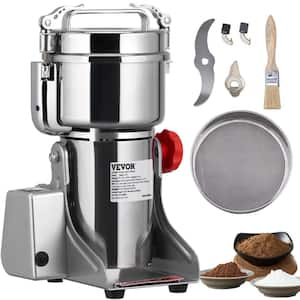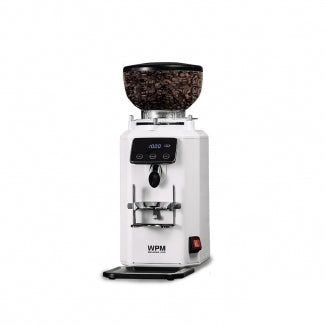Increase Productivity with an Industrial Coffee Grinder in Your Establishment
Increase Productivity with an Industrial Coffee Grinder in Your Establishment
Blog Article
Industrial Coffee Mill Guide: Boost Effectiveness and Top Quality
In the competitive landscape of coffee manufacturing, picking the appropriate commercial coffee mill plays an essential duty in improving both efficiency and item quality. Comprehending the subtleties of numerous mill types and vital attributes-- such as personalized work setups and robust building-- can significantly affect the final flavor account of the coffee. The optimization of the grinding procedure, paired with diligent upkeep, is vital for sustaining performance over time. As we discover these vital components, it becomes noticeable that the implications prolong beyond plain tools choice, impacting total business success in manner ins which warrant closer examination.
Comprehending Grinder Kinds
When choosing a commercial coffee mill, recognizing the different types readily available is crucial for maximizing both flavor removal and functional efficiency. The 2 main sorts of mills are blade grinders and burr grinders. Blade grinders utilize sharp blades that slice coffee beans into inconsistent sizes, resulting in irregular extraction and possibly undesirable tastes. While blade grinders are typically extra affordable and ideal for small-scale procedures, they are generally not recommended for commercial usage.

Inevitably, selecting the appropriate kind of grinder is indispensable to keeping quality and performance in coffee production, making it critical for companies to purchase top quality burr mills for ideal results.
Trick Functions to Think About
Picking a commercial coffee grinder calls for cautious consideration of numerous essential features that can substantially influence both efficiency and the overall coffee experience. Among the key aspects to evaluate is the grinding system. Burr grinders are generally liked over blade grinders, as they offer a consistent work dimension, which is vital for optimum extraction and taste.
An additional crucial attribute is the mill's ability. Depending on the volume of coffee you need to process, pick a version that can handle your demands without giving up speed or high quality. In addition, consider the grind settings provided. A flexible grinder with numerous setups permits you to customize the work dimension to various developing approaches, enhancing the coffee's flavor profile.
Assess the mill's noise degree, especially in an active café or manufacturing atmosphere, where too much sound can be disruptive. Investing in a mill that balances these functions can significantly boost both functional effectiveness and the top quality of the coffee offered.
Optimizing Grinding Refine
To achieve the finest lead to coffee preparation, enhancing the grinding process is essential. The work dimension considerably affects extraction, flavor, and overall high quality of the made coffee. Different brewing methods call for particular work sizes; for example, coffee demands a fine grind, while French press demands a coarse structure. Recognizing the relationship between work size and brewing technique is the very first step in optimization.


In addition, keeping track of the grinding speed can enhance the process. Slower grinding usually produces much less warmth, maintaining fragile tastes and aromas. On the other hand, quicker grinding may generate excessive heat, negatively affecting the coffee's quality.
Maintenance and Care Tips
Correct maintenance and care of industrial coffee grinders are important for making sure ideal efficiency and longevity. Normal cleansing is the foundation of maintenance; deposit build-up can influence taste and grinding effectiveness. It is recommended to clean the mill after each use, cleaning down the outside and eliminating any coffee premises from the burrs.
Furthermore, check the grinding burrs for wear and tear. Dull burrs can compromise work uniformity, so they should be changed as needed. Industrial Coffee Grinder. Regularly calibrating the grinder is additionally critical, as this preserves the desired work size for various developing techniques
Lubrication of relocating components should be done according to More Help the producer's requirements, as this minimizes friction and extends the life of the devices. It is necessary to use food-grade lubricating substances to guarantee safety and security and compliance with wellness guidelines.
Lastly, maintain the mill in a completely dry and stable setting to avoid rust and corrosion. By sticking to these maintenance and treatment suggestions, drivers can improve the performance of their industrial coffee mills while making certain high-grade outcome and expanded operational life.
Roi Evaluation
Reviewing the roi (ROI) for industrial coffee mills is essential for businesses seeking to enhance their coffee manufacturing capacities. A comprehensive ROI evaluation helps identify the monetary stability of purchasing high-quality mills, allowing companies to evaluate the preliminary expenses versus potential gains.
To carry out a thorough ROI evaluation, organizations need to take into consideration a number of vital variables. Initially, analyze the acquisition rate of the grinder, including setup and any type of required modifications to existing infrastructure. Next, calculate operational prices, including power usage, maintenance expenses, and labor efficiency renovations. High-performance mills often result in reduced grinding time and raised throughput, which can dramatically boost efficiency.
Additionally, think about the impact on item high quality. Industrial Coffee Grinder. Superior grinders generate a more regular grind dimension, which can enhance flavor accounts and customer contentment, eventually driving sales. By increasing the top quality of the end product, companies can warrant higher rates, leading to increased profits
Verdict
In summary, a commercial coffee grinder plays a pivotal duty in improving both efficiency and product top quality within coffee production. By selecting top notch burr mills equipped with necessary features such as adjustable grind setups and long lasting building and construction, companies can guarantee optimal taste removal. Regular maintenance is vital for sustaining mill efficiency and making best use of customer satisfaction. Ultimately, the tactical financial investment in a reliable grinder contributes dramatically to boosted profits and competition in the coffee industry.
In the competitive landscape of coffee production, choosing the best industrial coffee mill plays a crucial role in boosting both performance and product quality. The two key types of mills are blade mills and burr mills. Within Homepage the burr grinder see here now group, there are level burr grinders and conical burr grinders, each with its benefits. Burr mills are typically preferred over blade grinders, as they supply a constant grind dimension, which is vital for optimal extraction and taste.
In summary, an industrial coffee grinder plays a crucial role in enhancing both efficiency and product quality within coffee production.
Report this page